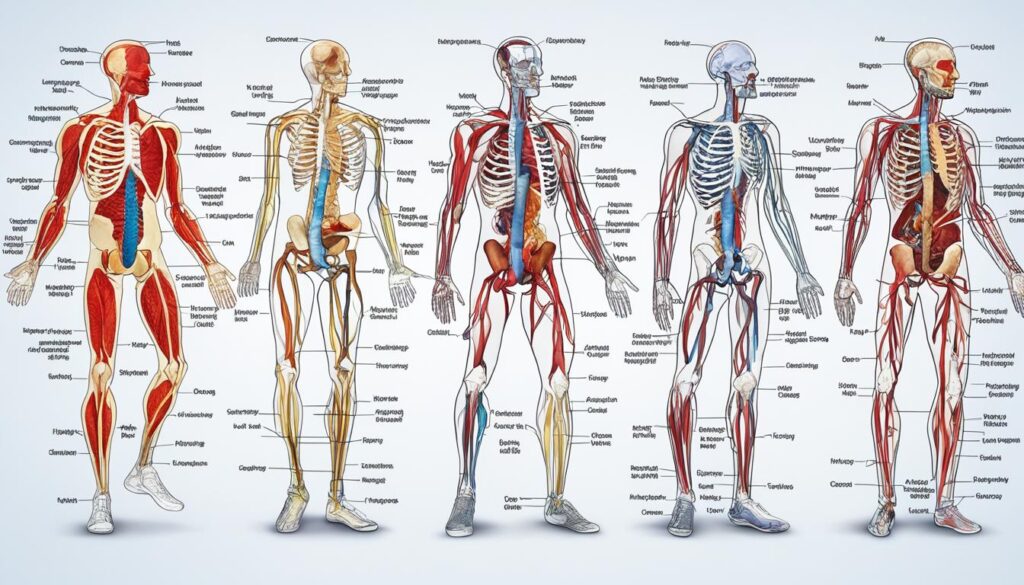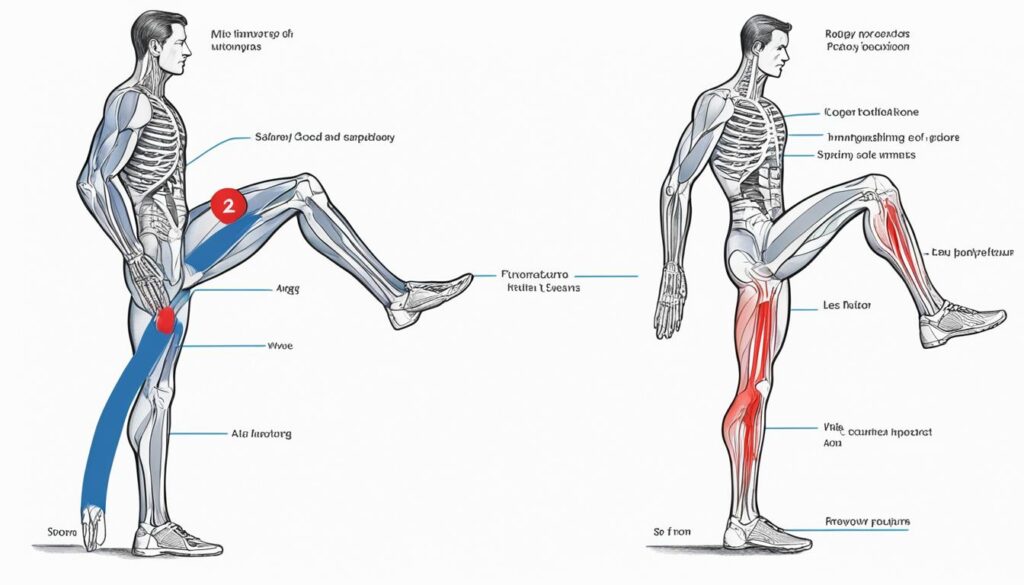Leg cramps, those sudden and involuntary muscle contractions in your leg, predominantly in your calf, can leave you grappling with discomfort. These can last anywhere from a few fleeting seconds to enduring several long minutes, often leaving behind soreness that extends from a couple of hours to numerous days. Let’s dive into causes of leg cramps, leg cramp triggers, and answer the question – why do leg cramps occur.
The common causes of leg cramps are not always linked to extreme physical exertion or hot conditions. Surprisingly, they can emerge suddenly without any obvious triggers. This makes them a critical issue to understand and manage, as underlying health issues often precipitate cramps. Typically, self-care measures can alleviate the occasional cramp, but persistent or severe discomfort should motivate you to seek medical attention.
Key Takeaways
- Leg cramps are involuntary, painful muscle contractions, occurring most frequently in the calf muscles.
- They often occur abruptly and can last anywhere from a few seconds to several minutes.
- Dehydration, strenuous exercise, or underlying health conditions can trigger leg cramps.
- While they are usually harmless, regular or severe cramps might indicate a potentially serious health issue and should encourage a visit to a medical professional.
- The keys to prevention and management lie in understanding the possible triggers and maintaining a healthy lifestyle.
Understanding Muscle Cramps: What Happens and Why
Muscle cramps are a common phenomenon most people have experienced at some point. Often, you might wonder what causes leg cramps? A muscle cramp is essentially a sudden, forceful tightening of the muscle. This usually leads to a burst of sharp pain that can last for varying durations. Despite the discomfort they cause, muscle cramps are generally not harmful. They can, however, disrupt your activities and negatively impact your quality of life.
There are numerous reasons, or muscle cramp causes, to be considerate of. Overuse or strain of muscles, dehydration, or maintaining a position for too long can contribute as leading triggers. However, the exact cause is not always clear. It’s worth noting, though, that even if no specific reason can be identified, muscle cramps should not be dismissed. In some situations, they can indicate certain underlying conditions, such as blood flow issues, nerve compression, or mineral deficiencies.
“Frequent leg cramps without a clear cause or that aren’t related to physical activity might indicate a health problem that requires medical attention.”
Age plays a significant role in the leg cramps reasons. Older adults may experience cramps more frequently due to the natural loss of muscle mass that occurs with aging. This reduced musculature, combined with constrained blood flow during physical activities, increases the likelihood of muscle cramps.
- Overuse or strain of muscles: This is common among athletes and individuals who engage in strenuous physical activities. Muscles that are fatigued are more prone to cramps.
- Dehydration: Insufficient fluid intake, particularly during hot weather or intense exercise, can lead to dehydration—a common trigger of muscle cramps.
- Maintaining a position for too long: Sitting or standing for extended periods without movement can strain the muscles and increase the risk of cramps.
Common Causes of Leg Cramps
Understanding the factors causing leg cramps is essential for both prevention and treatment. Common causes of these sudden, painful contractions typically revolve around muscle stress, dehydration, and prolonged static posture, but they can also hint at underlying ailments. Deeper comprehension of these factors can promote appropriate precautions, management, and resolution strategies.
Sudden Intense Activity and Overexertion
Sudden, intense physical activity or overexertion often leads to leg cramping. When muscles are abruptly stretched beyond their capability, they tend to fight back, resulting in painful spasms. This strain chiefly originates from vigorous exercises like sprinting or high-intensity interval training, which force the muscles to work harder within shorter time frames. Individuals can mitigate this underlying cause of leg cramps by adopting a balanced workout routine that comprises adequate warm-up and cooldown periods.
Dehydration and Electrolyte Imbalance
Another leading cause behind leg cramps is dehydration and electrolyte imbalances, particularly of vital minerals like potassium, calcium, and magnesium. Undue loss of body fluids and electrolytes—mostly due to excessive sweating—impairs muscle functioning, hence provoking cramps. Regular hydration and maintaining a balanced diet enriched with these minerals will help dodge this issue.
Extended Periods of Inactivity or Holding a Position
Remaining immobile or sustaining a single position for prolonged periods often contributes to leg cramps. Such inactivity can impose continual stress on specific muscle groups and restrict blood flow to these areas, triggering cramps. Regular movement and stretching, particularly during long sessions of work or travel, could be beneficial in preventing this form of muscle discomfort.
Being aware of these common leg cramp causes can significantly aid in preventing these intensely disruptive episodes. Ultimately, maintaining a healthy lifestyle that includes regular exercise, proper hydration, a balanced diet, and sufficient rest is key in combatting the menace of muscle cramps.

In summary, understanding the common causes of leg cramps can bestow beneficial insights into managing and preventing these encounters with leg cramps. Acknowledging and addressing these leg cramp triggers can pave the way towards improved leg health and comfort.
Leg Cramp Triggers and Underlying Causes
Often night leg cramps are idiopathic, that is, without any identifiable cause. However, they can sometimes serve as an signal of overtired muscles or nerve dysfunction. Identifying the potential triggers or underlying causes of leg cramps can aid in their management and prevention.
Particular medical conditions, for instance, kidney failure and blood flow problems, are recognized as triggers of leg cramps. These conditions are particularly suspect if other symptoms associated with them are already present. Furthermore, intake of certain medications, such as diuretics, can potentially contribute to the occurrence of muscle cramps, although no direct link has been firmly established.
It’s critical to distinguish between restless legs syndrome and night leg cramps. While the latter involves pain and involuntary muscle contractions, restless legs syndrome is marked by an irresistible urge to move the legs, without any accompanying pain sensation.
| Leg Cramp Conditions | Symptoms |
|---|---|
| Night Leg Cramps | Pain and involuntary muscle contractions primarily occurring at night or during rest periods. |
| Restless Legs Syndrome | Strong desire to move the legs, primarily when at rest, but without any associated pain. |
By understanding what causes leg cramps can help individuals employ preventative measures or seek appropriate medical interventions to manage these uncomfortable muscle contractions.
Conclusion
Leg cramps are a common concern that can sometimes serve as an alarm bell for more serious health conditions. It’s imperative to understand the possible leg cramp causes that range from everyday lifestyle factors like dehydration and overexertion, to significant medical conditions such as nerve compression and mineral imbalances. Only with this understanding can individuals be equipped to manage and alleviate these disruptive incidents.
Moreover, maintaining overall health is crucial when the topic at hand is why do leg cramps occur. Staying well-hydrated, ensuring our physical fitness levels are high, and incorporating regular stretching exercises into our daily routines can indeed help ward off severe or chronic leg cramps. But, when leg cramping persists or the severity increases, it’s critical to seek medical advice.
The connection between muscle cramp causes and preventative methods is undeniable. A proactive approach to understanding the reasons why cramps occur, combined with consistent self-care practices, can aid significantly in reducing the frequency and intensity of muscle cramps in the leg. Remember, awareness and prevention are your most effective tools. Don’t let leg cramps slow you down!





